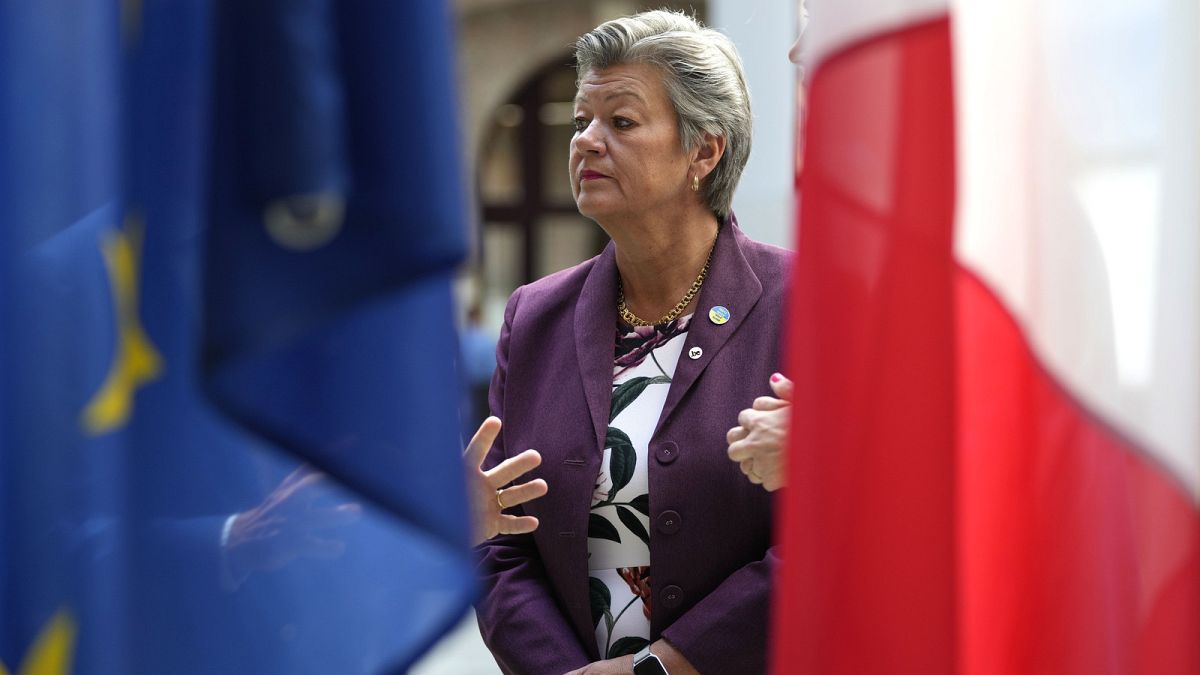“All member states have to implement it and apply it,” Ylva Johansson, the Commissioner who spearheaded the sweeping reform, told Euronews on Thursday.
“If not, the Commission will of course act and use – if necessary – infringement (procedures),” she added. “But I must say that I’m pretty convinced that member states will implement the Pact now quite quickly.”
The New Pact is a set of five inter-connected pieces of legislation aimed at establishing common, predictable rules to manage the reception and relocation of asylum seekers. This, the thinking goes, will turn the page on a decade of go-it-alone, chaotic reactions.
Following almost four years of painstakingly slow negotiations, MEPs narrowly backed the new pact in a vote on Wednesday, clearing the path for the final rubber stamp from member states, expected at the end of this month.
But shortly after the vote on Wednesday, Polish Prime Minister Donald Tusk came strongly against the overhaul, calling it “unacceptable” and attacking the proposed system of “mandatory solidarity”, one of the main novelties of the New Pact.
Under this system, member states will have three options to manage migration flows: relocate a certain number of asylum seekers, pay €20,000 for each claimant they refuse to relocate, or finance operational support, like staff and equipment. Brussels aims at 30,000 relocations per year but insists the system will not force any country to accept refugees as long as they contribute through any of the other two options.
“We will protect Poland against the relocation mechanism,” Tusk told a press conference in Warsaw.
Tusk – who belongs to the centre-right Civic Platform – was elected prime minister last December, vowing to lead a pro-European government and bring the eight-year Eurosceptic rule of the Law and Justice party (PiS) to an end.
He is seen as a close ally of Commission President Ursula von der Leyen but his firm rejection of the pact has somewhat thrown cold water on a reform hailed “historic” and a “huge achievement for Europe” by von der Leyen herself.
Hungary, another well-known critic of the New Pact, also expressed censure.
“It’s a pity that after nine years since the peak of the migration crisis, the Parliament came up with a solution that basically is a serious breach of national states’ sovereignty,” Zoltán Kovács, the government’s international spokesperson, said on Thursday during a briefing with journalists in Brussels.
“The Pact is not going to provide a workable solution for any member state,” he added.
Kovács insisted his country would “speak loudly against” the New Pact, arguing it does not take into account the Hungarian experience and is “doomed to fail.”
But when asked if Budapest would openly disregard the rules and risk being slapped with an infringement procedure, the spokesperson was more careful and said his government still has to examine the “exact wording” included in the overhaul.
In the lead-up to the vote in Parliament, the reform had sparked opposition from both the right and the left. Some progressive voices felt the New Pact yielded to pressure from far-right forces and put the human rights of asylum seekers at risk.
Far-right voices including France’s Rassemblement National also voted down parts of the pact, arguing its provisions do not go far enough to protect borders.
Its approval comes just in time for the European elections, which will be held on June 6-9, and in which migration is set to be top-of-mind for voters.
A recent exclusive Euronews/Ipsos poll found just 16% of EU citizens endorse the bloc’s policy on migration, while more than half (51%) oppose it.
Cooperation with some third countries ‘difficult’
Another critical aspect of the EU’s migration policy is its “external dimension,” a broad term used to refer to agreements with third countries to curb the departure of irregular migrants towards Europe.
Brussels has already struck agreements with Tunisia, Mauritania and Egypt, where EU money is pumped into the countries’ economies in exchange for targeted measures to decrease migrant flows and clamp down on human traffickers.
The deals have been blasted by MEPs and human rights defenders for failing to recognise mounting evidence of human rights violations, particularly by the Tunisian authorities.
Despite not having a formal agreement with Libya, the EU has also spent an estimated €59 million to boost the border management mechanisms of Libyan authorities since 2017, despite overwhelming documented evidence of illegal pushbacks and abusive treatment of sub-Saharan migrants in Libyan detention centres.
“The cooperation with Libya is difficult,” Johansson acknowledged in her interview with Euronews. “And we are having strong views, for example, when it comes to detention centres (…) some of those have really unacceptable conditions.”
She added that the EU was working in close collaboration with the African Union and the United Nations to rescue refugees out of Libya and into safer countries under the so-called “emergency transit mechanism.”
But the bloc is also continuing to “support” the Libyan coastguard on their search and rescue operations “so that people will not actually lose their lives in the Mediterranean,” Johansson added.
Last year, a UN report found that crimes of humanity had been committed by the Libyan coastguards – which had received EU support – including women being forced into sexual slavery, arbitrary detention, murder, torture, rape, enslavement, and enforced disappearance.
You might also like
European Parliament narrowly endorses EU migration reform, moving it closer to the finish line
Boat lost near Greek island leaves 3 dead, arrivals double compared to last year
Greek voters name skyrocketing prices as their top priority ahead of EU elections
By Vincenzo Genovese & Mared Gwyn Jones, Jorge Liboreiro:
Source:euronews.com
